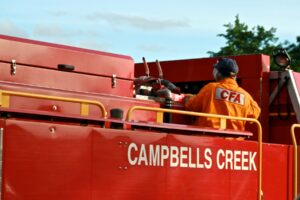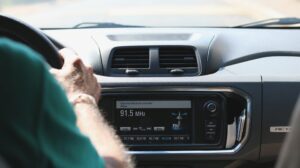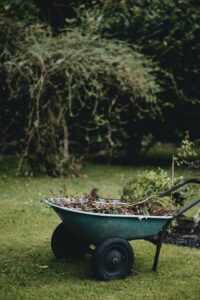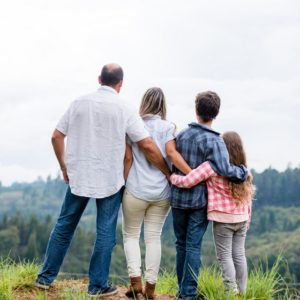 Victoria is one of the most fire-prone places in the world, and many areas are also susceptible to flooding. It’s not just people who live in the bush who need to be prepared – floods, fires and other natural disasters can occur in the suburbs too. It’s important for us all to be prepared and know what to do in the event a natural disaster, so we’ve gathered some tips and information to help you prepare and plan for emergencies.
Victoria is one of the most fire-prone places in the world, and many areas are also susceptible to flooding. It’s not just people who live in the bush who need to be prepared – floods, fires and other natural disasters can occur in the suburbs too. It’s important for us all to be prepared and know what to do in the event a natural disaster, so we’ve gathered some tips and information to help you prepare and plan for emergencies.
Download the VicEmergency app
This app will notify you of any bushfires, floods, storms, earthquakes, and even shark sightings. You can set your own watch zones in the app, so you’ll receive notifications about events near you. The VicEmergency app is available from the App Store and Google Play, and you can also follow VicEmergency on social media.
Tune your radio in to emergency broadcasters
Many community stations and local ABC radio stations provide updates during natural disasters and emergencies. Emergency Management Victoria has a list of official emergency broadcasters in Victoria, which you can find here. Remember, you may need to adjust the radio frequency for ABC as you travel.
Learn about Fire Danger Ratings and restrictions
Fire Danger Ratings (FDR) range from Moderate (green) through to Catastrophic (red) and are usually displayed as a semi-circle with a pointer to indicate the danger level. During bushfire season you’ll notice FDRs popping up as part of the weather report, and you may also spot them on CFA buildings or on signs around your area.
Have a bushfire plan
Creating a plan before disaster strikes is important, because we don’t tend to think clearly during an emergency. The Victorian CFA has a helpful template you can use to write up your own bushfire plan. It’s available on this web page.
Your plan should include whether you plan to stay and defend your home or leave early, and what Fire Danger Rating would be your cue to leave. You should also plan the route you’ll take and an alternative, a list of what you need to take with you, and details of anything you need to organise for your pets or livestock. Are there any neighbours, friends or family members you’ll need to check on? How will you stay informed of any updates? And what will you do if you’re not able to leave? These are all important things to think about when making a bushfire plan. It’s also a good idea to practice what you’ll do a few times, so you know roughly how long it’s likely to take.
Preparing your property for a fire

Follow these tips from the CFA to get your property ready for bushfire season:
- Keep grass cut to less than 10cm long
- Remove flammable items such as boxes, furniture and door mats from decks and verandahs
- Use pebbles or rocks in garden beds instead of flammable mulch
- Don’t have large shrubs next to or under windows
- Keep woodpiles and flammable liquids away from the house
- Cut back overhanging branches on trees, and make sure there are no branches within 10m of buildings
- Get rid of any dry grass, leaves, twigs or bark around the property
- Prune the lower branches of shrubs to separate them from surface fuels under the tree
- Prune shrubs so they are clear of any trees and branches
- You can find more tips from the CFA here: Before and During a Fire | CFA (Country Fire Authority)
What to do if you’re impacted by flooding
The following tips from VIC SES will help you stay safe in the event of a flood:
- Floodwater is dangerous. Never enter floodwater and never driving through floodwater. It can take just 15cm of flowing water to float a car.
- If you are inside, stay inside and be aware of rising floodwater. If floodwater comes inside, move to a higher point such as a kitchen bench or second storey.
- If you evacuate from your home or workplace, remember to turn off the gas and electricity.
- Check for road closures when you leave and follow instructions from emergency services.
- If you are outside, stay away from trees, drains, low-lying areas, creeks, canals, culverts and floodwater. Seek shelter indoors if you can, away from floodwater.
- Travel to the home of family or friends who are in a safe location, away from flooding.
- Find alternative travel routes if roads or underpasses are flooded.
- Be aware of driving hazards, such as mud, debris, damaged roads and fallen and damaged trees.
- If driving conditions are dangerous, safely pull over on higher ground, away from trees.
- For more tips from the SES, head to their website: Flood (ses.vic.gov.au)

Pack an emergency kit
Put together a bag or box of essential items and store it somewhere easy to reach in case you need to grab and go in a hurry. You might like to include some of the following:
- Photo ID, prescriptions and a copy of your will
- Cash, in case you can’t access online banking or get to an ATM
- Mobile phone charger/s and a fully charged portable charger
- List of phone numbers for friends and family, emergency services, and important contacts like your GP, employer, kids’ schools, utility companies and the local council
- USB stick containing scanned copies of photos and important documents such as birth certificates, medical information and insurance policies
- Hard-copy maps, in case you’re not able to use the Maps app on your phone
- Pure wool blankets, in case you need to shelter from fire
- A battery-operated radio, powerful torch and extra batteries
- Protective, long-sleeved clothing made from natural materials, a pair of sturdy shoes for each member of the family, and waterproof clothing for floods
- Non-perishable snacks and bottles of water
- Supplies for your pet – water bowl, water, food and a toy or blanket
- Toilet paper, tissues and feminine hygiene products
- A first aid kit and spare medications – EpiPen for allergies, asthma inhalers and spacers, painkillers, face masks, bandaids and bandages, and any medications you may need.
Helpful phone numbers and websites
- Emergency (police, fire, ambulance) – 000
- CFA – cfa.vic.gov.au
- VIC SES – ses.vic.gov.au; 132 500
- VicEmergency – emergency.vic.gov.au; 1800 226 226
- Bureau of Meteorology – bom.gov.au
- LifeLine – 13 HELP (13 43 57)
- BeyondBlue – 1300 224 636
- Parentline Victoria – 13 22 89
- Kids Help Line – 1800 551 800
- Nurse-on-Call – 1300 60 60 24
- Posions Information Centre – 13 11 26
- Register, Find, Reunite (if you can’t locate friends or family members) – register.redcross.org.au; 1800 727 077


